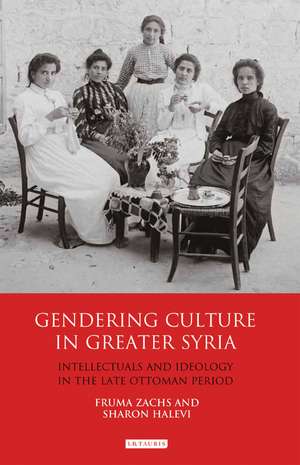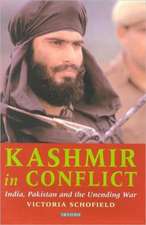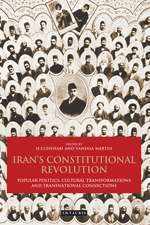Gendering Culture in Greater Syria: Intellectuals and Ideology in the Late Ottoman Period
Autor Fruma Zachs, Sharon Halevien Limba Engleză Hardback – 13 noi 2014
Preț: 714.12 lei
Preț vechi: 1027.41 lei
-30% Nou
Puncte Express: 1071
Preț estimativ în valută:
136.64€ • 143.05$ • 113.07£
136.64€ • 143.05$ • 113.07£
Carte disponibilă
Livrare economică 15-29 martie
Preluare comenzi: 021 569.72.76
Specificații
ISBN-13: 9781780769363
ISBN-10: 1780769369
Pagini: 256
Ilustrații: 16 bw integrated
Dimensiuni: 138 x 216 x 30 mm
Greutate: 0.45 kg
Editura: Bloomsbury Publishing
Colecția I.B.Tauris
Locul publicării:London, United Kingdom
ISBN-10: 1780769369
Pagini: 256
Ilustrații: 16 bw integrated
Dimensiuni: 138 x 216 x 30 mm
Greutate: 0.45 kg
Editura: Bloomsbury Publishing
Colecția I.B.Tauris
Locul publicării:London, United Kingdom
Notă biografică
Fruma Zachs is Professor of Middle East History at the University of Haifa, Israel. She is the author of The Making of a Syrian Identity: Intellectuals and Merchants in Nineteenth-Century Beirut and co-editor of Ottoman Reform and Muslim Regeneration (I.B.Tauris). Sharon Halevi is a senior lecturer of history and director of the Women's and Gender Studies Program at the University of Haifa, Israel. She is a founding member of the Israel Association of Feminist and Gender Studies, and holds a PhD from the University of Iowa.
Cuprins
IntroductionFrom Difa al-Nisa to Mas'alat al-Nisa: Readers and Writers Debate Women and Their Rights, 1858-1900. Love, Marriage and Social Reform and the Early Arabic Novel Repaving the Path of Muru'a: Manly Virtue and the Emergence of a Modern Masculinity in Greater Syria. Like a Planet without a Star: The Glocalization of Domestic Discourse. The Missing Link: The Nahda Novelists from Social Commentary to Political Critique. Beyond the Marriage Plot: Marriage, Sexuality and the Rise of Outlaw Emotions in the Turn of the Century Novels. Conclusions
Recenzii
[T]he material this book draws on is in and of itself rich and open to several avenues of interpretation and analysis. The authors are to be commended for weaving together lesser known authors and works with other seminal ones. The book also gives due attention to the earlier years of the nahda? , tracing debates about marriage and women's place in society back to the 1850s and earlier, and tracing the emergence of a discourse on masculinity in the region back to the 1870s.













